CIA Sponsored Terror, Civil Liberties, Surveillance, Violations of U.S. and International Law, Whistleblowers
Podcast: Play in new window | Download


Project Blueprint: Haiti
Haiti is a nation in crisis, spiraling out of control since last year’s assassination of its president, Jovenet Moise. The government has cratered, and 200 violent gangs have seized control. There’s no fuel, and food and water are hard to come by. Businesses and schools are shuttered and hospitals, banks, and grocery stores teeter on the brink of closure. Clean water is scarce, and Haiti faces another cholera outbreak. An estimated one million people are starving in the middle of Haiti’s biggest city. Kidnappings, human trafficking, homicides and sexual and gender-based violence are rampant.
Last week, the UN Security Council unanimously adopted a resolution demanding an immediate end to violence and criminal activity in Haiti. It calls for sanctions on groups and individuals threatening peace and stability in the impoverished nation. The sanctions resolution implicated Jimmy “Barbecue” Cherizier, whose gang has blockaded a central fuel terminal. Cherizier is a former police officer leading a group of gangs known as the G9 Family and Allies. He now faces asset freeze, an arms embargo and a travel ban.
Institute For Justice and Democracy In Haiti
Guest – Human rights attorney Brian Concannon, Executive Director of Project Blueprint, and the founder and former Executive Director of the Institute for Justice and Democracy in Haiti. Brian has been qualified as an expert witness on conditions in the country of Haiti in more than 40 cases in courts both in the United States and Canada.
—-
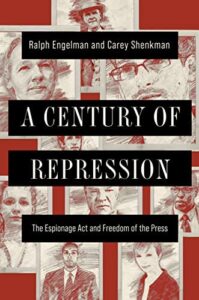
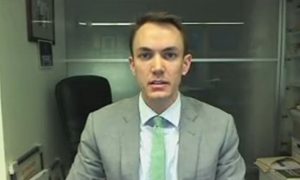
A Century of Repression: The Espionage Act and Freedom of the Press
For more than a century, the 1917 Espionage Act has been used by the United States government to target critics of its foreign and military policy. From suppressing criticism of U.S. participation in World War I to present-day attempts to silence whistleblowers, political dissidents and journalists who expose our nation’s war crimes, the Espionage Act is a dangerous weapon in the federal government’s legal arsenal. It has been employed to limit freedom of speech, freedom of the press, and freedom of information.
In their new book, A Century of Repression: The Espionage Act and Freedom of the Press, Ralph Engelman and Carey Shenkman trace the use of the Espionage Act against Eugene Debs, Daniel Ellsberg, Edward Snowden, Chelsea Manning and Julian Assange, among others. During World Wars I and II, the Act was primarily directed at political opposition to government policies. During the Cold War, it was used to criminalize leaks, manipulate the flow of information, and mold public opinion. And during the “War on Terror,” the Act has been used as a means to combat digital disclosure and journalism.
Journalist Julian Assange, founder and publisher of WikiLeaks, is currently locked up in a maximum security prison in London while the Biden administration attempts to have him extradited to the United States to stand trial on Espionage Act charges that could result in 175 years in prison. The basis for the indictment against him is WikiLeaks’ revelation of U.S. war crimes in Iraq and Afghanistan.
Guest – Carey Shenkman is a constitutional lawyer and litigator focusing on freedom of expression, transparency and technology. He serves on the panel of experts at Columbia University’s Global Freedom of Expression Program, and consults on media rights issues before the United Nations and around the world.
Hosted by Attorneys Heidi Boghosian, Marjorie Cohn and Julie Hurwitz

————————————–
Civil Liberties, Civil Rights, Human Rights, Supreme Court, U.S. Militarism, Violations of U.S. and International Law
Podcast: Play in new window | Download


Capitalism in the Anthropocene: Ecological Ruin or Ecological Revolution
Time is running out for humanity to avoid a catastrophic planetary tipping point. The globalized system of capital accumulation has induced humanity to foul it’s on nest. The result is a planetary emergency that threatens all present and future generations and thrown into question the continuation of civilization and ultimately the very survival of humanity itself. Only by addressing the social aspects of the current planetary environment is it possible to develop the ecological and social resources for a new journey of hope.
The United Nations international panel on climate change, the IPPC, predicts that as a result of the increase in greenhouse gases by the year 2050 there will be 1 billion climate refugees. Temperatures must be held within a 1.5 Celsius increase. If it goes up, as predicted, an increase of 4 degrees would end civilization.
The crises we are in our multiple. Species extinction, ocean acidification, sea level rise depletion of soil, forest fires, broiling heat waves, hurricanes and drought have plagued us in the last few years. One third of Pakistan was underwater.
Guest – John Bellamy Foster, editor of Monthly Review magazine and a professor emeritus of sociology at the University of Oregon. He has written many books including The Robbery of Nature“ and “The Return of Nature. His most recent book is Capitalism in the Anthropocene: Ecological Ruin or Ecological Revolution.
—-
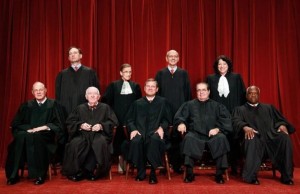
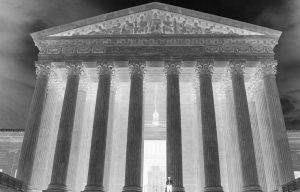
Impending Threats To American Democracy
In a recent New York Times article, by David Leonhardt, titled A Crisis Coming: The Two Twin Threats to American Democracy, Leonhardt, after first identifying the first threat being that things are now in place where for the first time in U.S. history, a legitimately elected president will not be able to take office, he identifies the second threat, as follows: “The second threat to democracy is chronic but also growing: the power to set government policy is becoming increasingly disconnected from public opinion. The run of Supreme Court decisions—both sweeping and, according to polls, unpopular—highlight this disconnect. Although the Democratic Party has won the popular vote in seven of the past eight elections, a Supreme Court dominated by Republican appointees seems poised to shape American politics for years, if not decades.”
And another headline in a recent edition of the New York Times reads, “Three Huge Supreme Court Cases That Could Change America.” And that article is simply one of many, of late, warning of how the ever-more conservative, indeed one could say, “reactionary” Supreme Court, in its just opened fall term, may well change America in a number of vastly different ways…and ways inconsistent with the majority political views of the American people.
Guest – Steve Rohde is the past chair of the ACLU Foundation of Southern California, the founder and current chair of Interfaith Communities United for Justice and Peace. He is a widely recognized expert on the U.S. Constitution, as well as a political activist. He is a prolific author. His books include American Words of Freedom and the book Freedom of Assembly. He has written numerous book reviews and articles on civil liberties and constitutional law, and his book reviews can be found frequently in the Los Angeles Review of Books.
Hosted by Attorneys Michael Smith and Jim Lafferty

————————————————-
Civil Liberties, Civil Rights, Human Rights
Podcast: Play in new window | Download
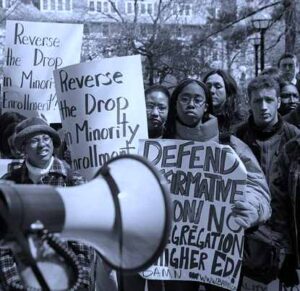
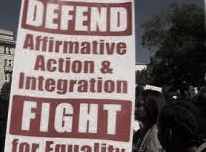
Supreme Court May Outlaw Affirmative Action
In 2003, the Supreme Court held in the case of Grutter v. Bollinger that the 14th Amendment allows public universities to consider race as a factor to assemble a diverse student body. The Court reaffirmed that holding in 2016. There are now two cases pending on the Court’s docket that it may well use to overrule Grutter and gut affirmative action. The Court will hear oral argument in these two cases on October 31.
The Students for Fair Admissions is suing Harvard and the University of North Carolina-Chapel Hill, asking the Court to overturn Grutter. The group says its mission is helping “to restore colorblind principles to our nation’s schools, colleges and universities.”
“Colorblind” is a euphemism for allowing the conditions that created the racial inequality and unequal opportunity to continue.
UNC-Chapel Hill, wrote education journalist Nick Anderson in the Washington Post, was “founded to educate the enslaving elite of this Southern state, allied for generations with the cause of white supremacy, roiled by racial tensions in recent years over the fate of a Confederate monument and treatment of Black faculty members.”
On October 4, the Court heard oral argument in Merrill v. Milligan, which the conservative majority will likely use to uphold Alabama’s racist gerrymandered district map. During the argument, Justice Ketanji Brown Jackson mentioned the “race-conscious” goal of the drafters of the 14th Amendment, who were “trying to ensure that people who had been discriminated against … were actually brought equal to everyone else in society.” “That’s not a race-neutral or race-blind idea,” Jackson said.
With the radical right-wing supermajority on the Supreme Court, it is likely that the Court will outlaw affirmative action, using the so-called “colorblind” rationale.
Guest – Jason Williamson is Executive Director of the Center on Race, Inequality, and the Law at New York University School of Law. He teaches a course in Social Justice Lawyering and runs the Racial Justice Clinic.
—-
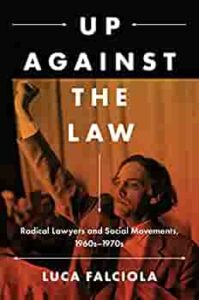

Up Against the Law: Radical Lawyers and Social Movements, 1960s-1970s
The 1960s and 1970s weren’t just the time when protesters took to the streets to fight for civil rights, and against the Vietnam War. It was also a period when radical lawyers defended dissidents and worked closely with them to bring their messages into the nation’s courtrooms and into the public sphere.
Luca Falciola has just published a book about the militant attorneys who fought for social change arm-in-arm with activists. Breaking from the traditional role of attorneys, they identified with their clients and their causes, and challenged the conservative rules and trappings of the legal profession. The book is titled Up Against the Law: Radical Lawyers and Social Movements, 1960s-1970s, published by the University of North Carolina Press.
At the heart of this work is the history of the National Lawyers Guild. Founded in 1937, the Guild was established as an alternative to the American Bar Association which was not racially integrated. Since Law & Disorder Radio began airing in 2005, its cohosts have been longtime Guild members and leaders. Many of our guests are Guild members as well.
Guest – Luca Falciola is a lecturer at Columbia University. His publications include the award-winning book about the Movement of 1977 in Italy, and several articles on various aspects of contentious politics between the 1960s and the 1980s.
Hosted by Attorneys Heidi Boghosian and Marjorie Cohn

—————————————
CIA Sponsored Terror, Civil Liberties, Civil Rights, Human Rights, Supreme Court, War Resister
Podcast: Play in new window | Download
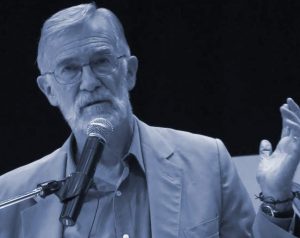
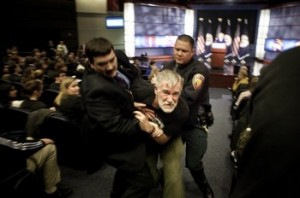
A Unified Movement of Peace
The world today is threatened with war, poverty, displacement and hunger like no other time since 1937 when World War II began with the Japanese invasion of China. Within four years the war had spread leading to the death of tens of millions of people. This included 50 million Russians, 400,000 Americans and finally hundreds of thousands of Japanese civilians in 1945 when the US initiated the nuclear age with the bombing of Hiroshima and Nagasaki demonstrating American power to the Russians. This initiated the Cold War which is now in a second stage. It must be stopped.
The American wars in Vietnam and Iraq were based on lies. We were told in 1965 by President Lyndon Johnson that the Vietnamese had attacked American ships in the Gulf of Tonkin. This was a lie. In 2003 we were lied to by President George W. Bush who told us that Saddam Hussein had weapons of mass destruction.
The proxy war in Ukraine against Russia is based on the ubiquitous lie that the Russians were unprovoked. It threatens to spin out of control. Why are we again in this situation and what can we do about it? What is desperately needed is a unified American peace movement.
Guest – Ray McGovern former CIA intelligence analyst, Ray briefed President George H. W. Bush every morning on intelligence matters, particularly with respect to Russia. He is a founder of VIPS, Veteran Intelligence Professionals for Sanity and a contributor to the blog Common Dreams.
—-

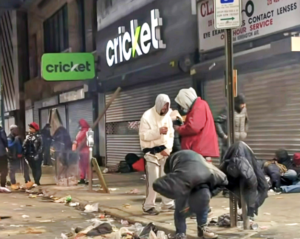
Doctors Lose Licenses For Properly Prescribing Opioids
The CDC wrongly thought pain management doctors were over prescribing opioids. The CDC issued guidelines in 2016 put limits on the amount of opioids doctors could prescribe thinking that high doses of Oxycontin lead to addiction and death. These guidelines were disastrous for chronic pain patients. Many were driven to buy illegal drugs on the street which were laced with poisonous fentanyl. In 2021 this led to 100,000 deaths in the United States.
Several insurance companies encouraged the CDC to impose limits on doctors prescribing Oxycontin and to taper their patients. Opioids are very expensive. The insurance companies were fortified in their erroneous belief by the efforts of a certain organization of doctors who are not pain management specialists.
When the CDC guidelines were exceeded, the Department of Justice threatened to indict doctors and got them to stop practicing medicine. The doctors gave up their medical licenses and licenses to prescribe narcotics. Some were prosecuted. Some went to prison. Some endured large fines. Seventeen hundred out of 6000 pain management doctors were removed from the practice of medicine.
Doctors who refused to taper were victimized. These doctors correctly believed that their patients were dependent on high dosages of opioids but were not drug addicts. These doctors understood that denying their patients high dosages of opioids would lead to suicides and deaths by overdose from street drugs.
The United States Supreme Court recently ruled in the case of The United States v Ruan that doctors have the right to treat their patients as they see fit without government interference, they ruled 9 to 0 that doctors who prescribed opioids in good faith did not have the requisite mindset, mens rea, to be found guilty of over prescribing.
Guest – Kelly Dineen Gillespie is a professor of law and the Director of the health law program at Creighton University School of Law. She teaches health law and bioethics. Dr. Gillespie holds a PhD in health care ethics as well as a law degree. Before attending law school she worked as a nurse in neurosurgery and transplant ICUs. She co-wrote two friend of the court briefs in the significant Ruan v United States case on behalf of professors of health law and policy before the US Supreme Court regarding criminal distribution under the Controlled Substance Act as applied to doctors‘ prescriptions. In June 2022, the Supreme Court adopted much of the reasoning advanced in these briefs in a unanimous decision supporting doctors.

————————————
Civil Liberties, Civil Rights, Human Rights, Supreme Court
Podcast: Play in new window | Download
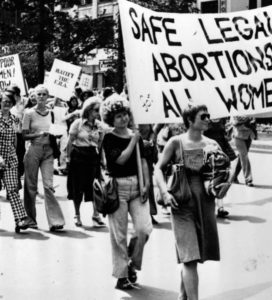
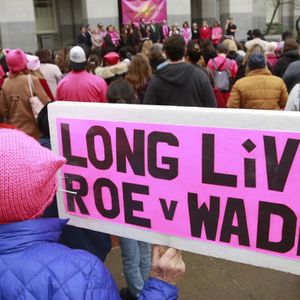
Analysis: States Respond To Overruling Of Roe v. Wade
Since June, when the right-wing majority of the U.S. Supreme Court overruled Roe v. Wade and retracted the constitutional right to abortion, many states have enacted onerous restrictions or outright bans on abortion. In states like California, the right to abortion has been safeguarded by legislation and judicial interpretations of the California Constitution. But if in the future, Republican governors in California appoint a majority of conservative “justices” to the state supreme court, the right to abortion will be imperiled.
On November 8, voters in three states – California, Michigan and Vermont – will decide whether to enshrine the right to abortion in their state constitutions. People in Kentucky will vote on an amendment that specifically excludes the right to abortion from constitutional protection. In August, Kansas voters rejected a similar amendment that would have explicitly said that its constitution does not provide the right to abortion.
Guest – Law and Disorder co-host and legal scholar Marjorie Cohn discusses why it’s crucial that states amend their constitutions to protect the right to abortion. Marjorie is professor emerita at Thomas Jefferson School of Law and former president of the National Lawyers Guild, who writes a regular column at Truthout called “Human Rights and Global Wrongs.” She has published several books and does political and legal media commentary for local, national and international media outlets.
—-


Attorney Deborah LaBelle: Planned Parenthood v. State of Michigan
Deborah LaBelle is a Michigan attorney and writer whose work centers on constitutional and civil rights in class actions and community representation utilizing a human rights framework. Ms. LaBelle has been lead counsel in over a dozen class action lawsuits that have successfully expanded the civil and constitutional rights of her clients in both federal and state courts, including before the U.S. Supreme Court and in international fora.
Ms. LaBelle has been the recipient of numerous awards, including the National Lawyers Guild’s Law for the People Award, the National Trial Lawyer of the Year Award from Public Justice Foundation, and the Federal Bar Association’s Wade McCree Jr. Award; Michigan ACLU Civil Libertarian of the Year Award; as well as several others too long to list here.
She is currently co-counsel (with me and others) on the Flint Water class action litigation – a case in which we successfully argued to the Michigan Supreme Court that our state constitution has embedded within it the fundamental due process right to bodily integrity.
What brings her here today, is Ms. LaBelle’s most recent involvement in the historic case of Planned Parenthood v. State of Michigan. This case was triggered by the nation-wide crisis created by the U.S. Supreme Court in its reversal of Roe v. Wade in Dobbs v. Jackson. Dobbs awoke a long-dormant 1931 felony statute in Michigan which criminalizes all medical and legal actions taken to support a person who seeks or needs an abortion. This month, in the Planned Parenthood case, the Michigan Court of Claims issued a historic state-wide injunction against that criminal law, holding that it violated the now-recognized Michigan constitutional right to bodily integrity. While this injunction is still in effect (and inevitably on its way to being appealed), we have seen another pro-choice victory in Michigan, that is, successfully getting Proposition 3, a constitutional amendment referendum, on the ballot that would explicitly recognize the constitutional right to abortion in Michigan.
Hosted by Attorneys Heidi Boghosian, Marjorie Cohn and Julie Hurwitz

——————————
Civil Liberties, Civil Rights, Crony Capitalism, Human Rights
Podcast: Play in new window | Download

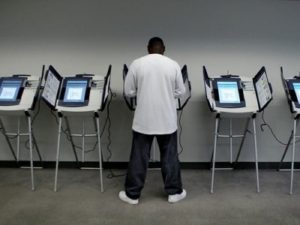
Chris Hedges: Social Change And Democracy 2022
You can’t have organized activity for social change without democracy. Social change and democracy are bound up with one another. But America is not a democracy. This is by design. It was never intended to be. The founding fathers – there were no founding mothers – wrote a document 245 years ago in Philadelphia that excluded more Americans than it included.
The Supreme Court ruled in the Citizens United case that corporations are people entitled to free speech rights. So they can give as much money as they want to political campaigns. Last month an industrialist gave $1.6 billion to the Republicans. Like Bob Dylan wrote, “money doesn’t talk it swears.“ It is impossible to have a democracy in a country like ours with such vast income and wealth disparity.
The Democratic Party and the Republican Party have a lock on the political process. It is nearly impossible to start a third-party. When Ralph Nader ran the Democrats did everything they could to stop him, launching many lawsuits trying to knock him off state ballots.
Since its founding, the ever-growing effects of unlimited money in elections, the partisan gerrymandering of legislative districts, the fraudulent removal of poor and minority voters from voter registration rolls, reduction in the number of voting locations in minority districts, the unfair advantage given to Canada is favored by corporate America, including America’s corporate media, all combine to leave us with a very unfair and very undemocratic system of governance in America
Guest – Chris Hedges, the most penetrating journalist we have. He once worked for the New York Times and even won a Pulitzer Prize. But he was forced out. He had a show on our RT which was closed down by our government and some 600 of his show “On Contact” were taken off of YouTube.
—-
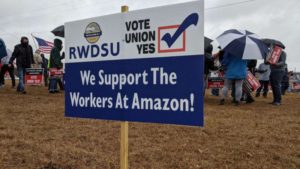
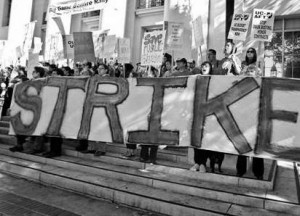
The State of Labor Unions And Recent Worker Strikes
For decades now only about 11% of workers in America have been members of unions, whereas previously more than 35% were union members. Various pieces of pro-management legislation and court opinions caused this diminution in union membership and, as a consequence, a weakening of the rights of American workers. But in recent years, as a result of militant fight back efforts by exploited workers in many industries, unions have once again been having some success in organizing efforts at various workplaces, like Amazon, Starbucks, Apple, and Trader Joe’s.
But federal and state laws still create an up-hill fight for those seeking to organize workers into unions, and to win good labor contracts. So today we ask: do these few but growing number of recent labor union victories truly represent a new day for American workers and the unions that serve them? Do these localized labor victories suggest that more and bigger victories for workers are now within reach? Or, have these recent victories been simply exceptions to the still dismal overall state of union organizing in America? Are either of the two capitalist political parties sufficiently committed to advancing the right of workers to organize unions, or is an independent political movement or party needed to make significant union/worker gains? And what about the pending threat of a nation-wide railway worker’s strike? And if the railroad companies and their workers cannot reach a negotiated settlement acceptable to the railway workers, could President Biden step in and use the Railway Labor Act in an effort to prevent a railway strike with its devastating consequences for the U.S. economy?
Guest – Alan Benjamin, long-time union organizer and workers’ advocate. A leader in his own union, he has served on the Executive Council of the San Francisco AFL-CIO Labor Council. He is also one of the principal organizers of the organization known as Labor and Community for an Independent Party, or LCIP.

—————————————-
























